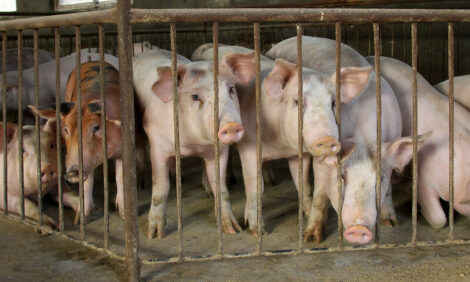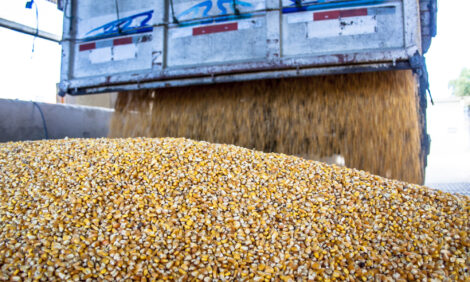



Germany's Lower Saxony preparing for outbreak of African swine fever
Prevention through large-scale exercise in the field with dogs and wild boars
Specially trained search dogs were used to locate wild boars. The realistic simulation trains processes for the effective containment of the highly contagious animal disease. The virus is harmless to humans.
Agriculture Minister Barbara Otte-Kinast took part in the practical exercise. She was impressed by the professional implementation of the individual measures that are intended to effectively contain the highly contagious animal disease.
"Against the background of the current outbreaks in Brandenburg, the danger is unfortunately real," said the minister.
An ASF outbreak would have enormous economic dimensions for Lower Saxony. 24.6 million pigs are kept nationwide (as of May 3, 2021), 9.4 million of them in Lower Saxony alone .
“I would like to thank everyone who has agreed to help fight the animal disease. What I was able to observe here today is a great team effort by those involved. Unfortunately, there is no such thing as 100% protection. It is therefore good that we are prepared to prevent the spread of the ASF in an emergency,” praised the minister.
More than 160 participants from all over Lower Saxony registered for the four exercise dates. In addition to representatives of the Lower Saxony veterinary authorities, people from institutions who will significantly support these authorities in combating animal disease in the event of an outbreak of the ASP, such as Lower Saxony State Hunters, Technical Relief Organization, Federal Armed Forces, Fire Brigade, Lower Saxony State Forests, Machine Rings and Rural People, took part in the exercise.
Two exercises were shown during the press conference: First, the recovery of a dead wild boar in the forest. Then the search with trained dogs for a dead wild boar in the area. The training of 23 cadaver dogs was also financed by the ML, as was the new wildlife coordinate recording app (WilKEA). This should not only record the coordinates of the location, but also the sample data of the dead animal. In the event of a possible ASF outbreak, WilKEA should be used by the rescue teams deployed by the local veterinary authorities concerned. The data collected is uploaded to a database, which the responsible veterinary office and the LAVES test laboratories have access to.
If an epidemic is suspected, blood samples must be taken from the animals by an official veterinarian. These samples are examined in the food and veterinary institutes Braunschweig / Hanover and Oldenburg of the LAVES.
"The employees in the LAVES laboratories perform highly professional work with the test examinations and can act quickly and purposefully in an emergency," says Prof. Dr. Eberhard Haunhorst, President of LAVES.
More than 2,500 samples can be examined daily. If a sample is positive, it is passed on to the national reference laboratory (NRL) of the Friedrich Loeffler Institute (FLI) for further confirmation. If the sample is also confirmed positive in the FLI, the outbreak is considered officially determined.
Last year, 13,200 wild boar samples and 5,500 samples from domestic pigs were examined for ASF in the LAVES food and veterinary institutes in Braunschweig / Hanover and Oldenburg from the various monitoring programs: this year there have already been 4,500 samples from wild boar . All examinations were concluded with negative results.
But not only the investigation institutes of the LAVES are prepared for a crisis, also the Task Force Veterinary with its ASP coordination office. In the event of an animal disease, LAVES also provides on-site support in the district.
"Our employees are available to the local crisis centers for all questions relating to the fight against the animal disease," emphasized Haunhorst.
In 2014, 2018 and 2021 LAVES offered large-scale ASP exercises nationwide, participated in nationwide and transnational exercises and partially accompanied the regular exercises of the municipal veterinary authorities in Lower Saxony.
Background
The exercise takes place on the premises of the THW. The Mobile Combat Center (MBZ) is located there. It is a logistics center for the implementation and coordination of control measures for highly contagious animal diseases. The transportable complex of office, communication and hygiene units in container construction is a joint facility of all federal states, which can be used throughout Germany in the event of an outbreak of an animal disease. In this way, the MBZ can be transported as close as possible to the central location in the event of an epidemic.
After the FMD outbreaks (2001) in Great Britain and the Netherlands, the decision was taken in 2001 at the Agriculture Ministers' Conference to set up an MBZ for Germany based on the model of the Dutch Animal Disease Control Center (RCC). The MBZ consists of 71 containers. It was procured in 2006. Cost: 3.5 million euros (acquisition 2.5 million + 1 million for the material store: protective clothing, disinfection sluices, veterinary materials). The annual maintenance costs are around 120,000 euros.






